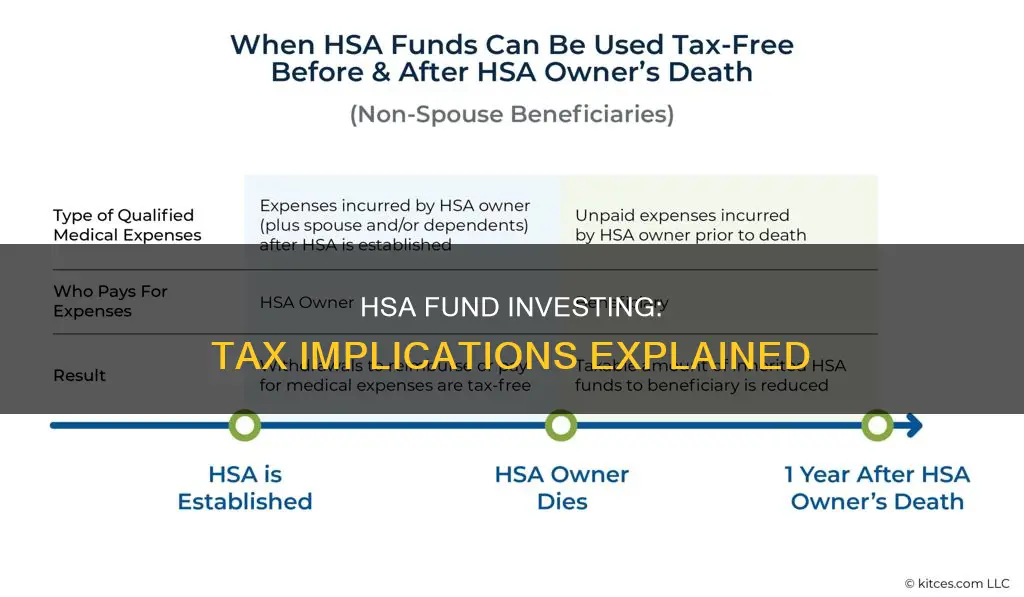
Health Savings Accounts (HSAs) are a great way to save for future medical expenses and invest in a variety of stocks, bonds, and mutual funds. They offer a triple-tax advantage: deposits are tax-deductible, growth is tax-deferred, and spending is tax-free. This means that contributions to your HSA are tax-deductible, or if made through payroll deductions, are pre-tax, which lowers your overall taxable income. All interest earned in your HSA is tax-deferred, meaning the funds grow without being subject to taxes unless they are used for non-eligible medical expenses. Withdrawals from your HSA are tax-free for eligible medical expenses (i.e., deductibles, copays, prescriptions, vision, and dental care).
| Characteristics | Values |
|---|---|
| Tax on contributions | Tax-deductible |
| Tax on investment gains | Not taxed |
| Tax on withdrawals for eligible medical expenses | Not taxed |
| Tax on withdrawals for non-medical expenses | Taxed |
What You'll Learn

Tax-deductible deposits
Health Savings Accounts (HSAs) offer a triple-tax advantage: deposits are tax-deductible, growth is tax-deferred, and spending is tax-free. This means that contributions to your HSA are tax-deductible, or if made through payroll deductions, are pre-tax, which lowers your overall taxable income. Your contributions may be 100% tax-deductible, meaning contributions can be deducted from your gross income.
The maximum amount you can contribute to your HSA depends on inflation and the type of high-deductible insurance policy you have. In 2025, people with an eligible individual high-deductible health plan can contribute up to $4,300 to an HSA. Family contributions are capped at $8,550. The IRS sets these limits annually, so it's important to stay within them to ensure you receive the full tax advantage.
If you have a High Deductible Health Plan (HDHP) through your employer, you can choose to contribute pre-tax dollars directly from each paycheck. If this is not an option, you can make post-tax contributions and claim a tax deduction on your tax return.
It's important to note that HSA money should be used for medical reasons. If you're under 65 and use the funds for other purposes, that money becomes taxable income, and you may face an additional 20% tax on the non-medical use of HSA money.
Setting Up Automatic Mutual Fund Investments with Fidelity
You may want to see also

Tax-free growth
Health Savings Accounts (HSAs) offer a triple-tax advantage: deposits are tax-deductible, growth is tax-deferred, and spending is tax-free. This means that any interest or earnings on the assets in the account are tax-free.
The tax-free growth of an HSA means that you can invest your funds and allow them to grow without being subject to taxes, as long as they are used for eligible medical expenses. This is a significant advantage of HSAs, as it allows your money to accumulate and grow over time, providing a greater financial safety net for future medical costs.
For example, if you invest a portion of your HSA balance and it earns dividends or capital gains, this growth is not subject to federal income taxes. This means that your HSA funds can grow without being eroded by taxes, maximizing the potential for compound interest over time.
It is important to note that if you withdraw HSA funds for non-medical expenses, you may be subject to taxes and an additional penalty. Therefore, it is essential to use your HSA funds for qualified medical expenses to take full advantage of the tax-free growth.
By utilizing the tax-free growth of an HSA, you can make the most of your healthcare savings and ensure that your funds are working hard for you, providing financial security and peace of mind for future healthcare needs.
Infrastructure Funds: Worthy Investment or Risky Business?
You may want to see also

Tax-free spending
HSAs offer a triple-tax advantage: deposits are tax-deductible, growth is tax-deferred, and spending is tax-free. This means that contributions to your HSA are tax-deductible, and any interest earned on your HSA is tax-deferred. Withdrawals from your HSA are also tax-free, as long as they are used for eligible medical expenses.
The tax-free spending advantage of an HSA means that you can use the funds in your HSA to pay for a variety of medical costs without being taxed on the withdrawal. This includes deductibles, copays, prescriptions, vision, and dental care.
The tax-free spending advantage of an HSA also means that you can use the funds in your HSA to invest in mutual funds or other securities. This allows your HSA funds to grow tax-deferred, and you can then use the funds to pay for qualifying medical expenses at any time, tax-free.
It is important to note that if you use the funds in your HSA for non-medical reasons, the money may become taxable income, and you may face additional taxes. Therefore, it is important to use your HSA funds for medical reasons only.
Target Funds or Invest: Which is the Best Retirement Strategy?
You may want to see also

Tax-free withdrawals for eligible medical expenses
There is no time limit on a taxpayer requesting reimbursement from an HSA for a medical expense. This means that contributions to an HSA can grow tax-free, similar to contributions to an IRA or Roth IRA.
Qualified medical expenses are those that would generally qualify for the medical and dental expenses deduction. This includes expenses for over-the-counter drugs and menstrual care products.
The taxpayer is responsible for documenting that the funds are used exclusively to pay for qualified medical expenses, that the expense has not been previously reimbursed or paid for by another source, and that the medical expense is not also included among itemized deductions.
If you are no longer an eligible individual, you can still receive tax-free distributions to pay or reimburse your qualified medical expenses.
BlackRock Funds: A Smart Investment Decision?
You may want to see also

Tax-free investment earnings
A health savings account (HSA) is a tax-efficient way to pay for a variety of out-of-pocket medical costs. HSAs are only available to people with a high-deductible health insurance plan. Contributions to an HSA are tax-deductible, and the account's earnings (if invested) are tax-free, as are withdrawals for eligible medical expenses.
The tax-free investment earnings of an HSA are a key benefit of the account. HSA funds can be invested in a broad range of mutual funds. Any investment gains in an HSA are not taxed, which allows your money to accumulate. Investment earnings, including dividends, are not considered taxable income. Distributions from your HSA that are used for qualified health care expenses are tax-free.
There is no time limit on requesting reimbursement from an HSA for a medical expense. This means that a taxpayer can defer reimbursement for medical expenses, allowing contributions to an HSA to grow tax-free, similar to contributions to an IRA or Roth IRA.
It is important to note that HSA funds should be used for medical reasons. If you are under 65 and use the funds for other purposes, the money becomes taxable income, and you may face an additional 20% tax on the non-medical use of HSA money.
A Guide to Investing in SBI Magnum Mutual Funds
You may want to see also
Frequently asked questions
There are several tax advantages to investing your HSA funds. Firstly, you don't pay federal income tax on contributions. Secondly, when you invest a portion of your balance, you aren't taxed on the earnings as it grows. Lastly, paying for qualified medical expenses is tax-free, whether you make the withdrawals now or in the future.
To get started, you need to enroll in the investment feature. You can then set up the automatic investing feature by going to the Investments page on the member website and following the instructions.
There are no transaction fees to buy or sell investments within your HSA, nor are there any fees to enroll in the Investment Account. However, mutual funds do have internal expenses, which can be found in the prospectus available on the investments website. Some mutual funds may also impose a short-term redemption fee on the proceeds of fund shares redeemed within a defined period, as outlined in the prospectus.







